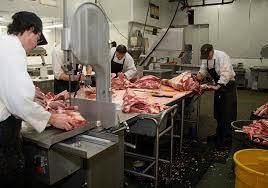 The Iowa Economic Development Authority has awarded 15 grants from the state Butchery Innovation and Revitalization Fund. Grants ranged from $40,000 to $50,000 per applicant. And were intended to allow small-scale meat processors to expand their operations and to conform to acceptable standards of slaughter and processing. The program funded with a $750,000 allocation by the Iowa Legislature requires a 50 percent match by recipients.
The Iowa Economic Development Authority has awarded 15 grants from the state Butchery Innovation and Revitalization Fund. Grants ranged from $40,000 to $50,000 per applicant. And were intended to allow small-scale meat processors to expand their operations and to conform to acceptable standards of slaughter and processing. The program funded with a $750,000 allocation by the Iowa Legislature requires a 50 percent match by recipients.
Using public funds to support businesses is acceptable if the state receives either a direct or indirect return. If the individual projects for which there were 54 applications, provided the possibility of a return, commercial finance institutions concentrating on the agricultural sector would have been willing to extend facilities. Given the fact that the state must use public funding to support commercial enterprises suggests a high risk. It will be interesting to learn how the state of Iowa or for that matter any other state or the USDA assess the return from similar grants.
 A secondary consideration will be the actual effect on increasing the supply of red meat at a competitive price. Since the 2020 disruption in supply of red meat as a result of COVID among workers in large plants, politicians have recognized the potential for constituent support by questioning the integrity and value of consolidation and economies of scale in red-meat packing. There is a current movement within the USDA to attempt to create an alternative product stream by establishing and expanding small-scale processors that would otherwise have been non-viable.
A secondary consideration will be the actual effect on increasing the supply of red meat at a competitive price. Since the 2020 disruption in supply of red meat as a result of COVID among workers in large plants, politicians have recognized the potential for constituent support by questioning the integrity and value of consolidation and economies of scale in red-meat packing. There is a current movement within the USDA to attempt to create an alternative product stream by establishing and expanding small-scale processors that would otherwise have been non-viable.
The Iowa Economic Development Authority has the obligation to justify the expenditure of public funds to support small-scale enterprises by publishing periodic progress reports and subjecting programs to review by disinterested agricultural economists.